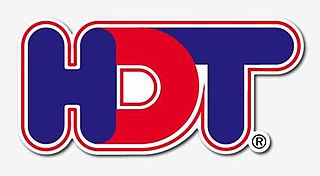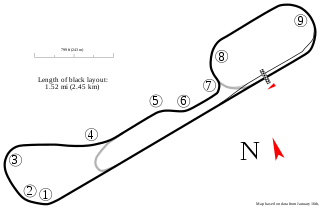
Phoenix Raceway is a 1-mile, low-banked tri-oval race track located in Avondale, Arizona, near Phoenix. The motorsport track opened in 1964 and currently hosts two NASCAR race weekends annually including the final championship race since 2020. Phoenix Raceway has also hosted the CART, IndyCar Series, USAC and the WeatherTech SportsCar Championship. The raceway is currently owned and operated by NASCAR.

The Holden Dealer Team (HDT) was Holden's semi-official racing team from 1969 until 1986, primarily contesting Australian Touring Car events but also rallying, rallycross and Sports Sedan races during the 1970s. From 1980 the Holden Dealer Team, by then under the ownership of Peter Brock, diversified into producing modified road-going Commodores and other Holden cars for selected dealers via HDT Special Vehicles.

Mallala Motor Sport Park is a 2.601 km (1.616 mi) bitumen motor racing circuit near the town of Mallala in South Australia, 55 km north of the state capital, Adelaide.
The 1972 Australian Manufacturers' Championship was a CAMS sanctioned national motor racing title for car manufacturers. It was contested over a five-round series.
The 1971 Phillip Island 500K was an endurance race for Group E Series Production Touring Cars held at the Phillip Island Grand Prix Circuit in Victoria, Australia on 24 October 1971. The event was staged over a race distance of 106 laps, totalling 318 mi (512 km). It was Round 4 of the 1971 Australian Manufacturers' Championship.
The 1979 Hang Ten 400 was an endurance motor race held at the Sandown Park circuit in Victoria, Australia on 9 September 1979. It was staged over 129 laps of the 3.11 km circuit, a total of 401 km. The race was Round 1 of the 1979 Australian Championship of Makes and as such it was open to Group C Touring Cars. It was the fourteenth in a sequence of annual Sandown long distance races. The race was won by Peter Brock.

The 1972 Hardie-Ferodo 500 was an endurance motor race open to Group E Series Production Touring Cars. The race was held on 1 October 1972 at the Mount Panorama Circuit just outside Bathurst in New South Wales, Australia. Cars competed in four classes defined by Capacity Price Units, where the engine capacity, expressed in litres, was multiplied by the purchase price in Australian dollars to arrive at a CP value for each vehicle. It was the 13th running of the Bathurst 500 race and the last to be held over the original distance of 500 miles. It was also the last to allow drivers to compete for the full distance without a relief driver. The race was the third round of the 1972 Australian Manufacturers' Championship.
The 1988 Australian Touring Car Championship was a CAMS sanctioned motor racing title for drivers of Group 3A Touring Cars. It was the 29th running of the Australian Touring Car Championship. The championship began on 6 March at Calder Park Raceway and ended on 17 July at Oran Park Raceway after nine rounds.

The Adelaide International Raceway is a permanent circuit owned by Australian Motorsport Club Limited under the auspices of the Bob Jane Corporation. The circuit is located 26 km (16 mi) north of Adelaide in South Australia on Port Wakefield Road at Virginia, and is adjacent to Adelaide's premier car racing Dirt track racing venue, Speedway City. AIR is owned by the Bob Jane Corporation and run by the Australian Motorsport Club Ltd.
The South Pacific Touring Series was an Australian Touring car racing series held annually from 1970 to 1975 during the month of February in conjunction with the Tasman Series for open-wheelers. Races counting towards the series were staged at Surfers Paradise in Queensland, Warwick Farm and Oran Park in Sydney, Sandown Park in Melbourne and, from 1972, at the Adelaide International Raceway in South Australia.
The 1985 Australian Touring Car Championship was a CAMS sanctioned motor racing title for drivers of Touring Cars. It was the 26th running of the Australian Touring Car Championship and the first to be contested using regulations based on the FIA's International Group A regulations after having been run under CAMS home grown Group C rules between 1973 and 1984. The championship began on 10 February 1985 at Winton Motor Raceway and ended on 14 July at Oran Park Raceway after ten rounds.
The 1971 Sandown 250 was an endurance motor race open to Group E Series Production Touring Cars. The event was held at the Sandown circuit in Victoria, Australia on 12 September 1971 over 130 laps, approximately 250 miles (403 km). As a round of the 1971 Australian Manufacturers' Championship, the race featured five classes based on Capacity Price Units with the CP Unit value for each model determined by multiplying the engine capacity of the vehicle in litres by its retail price in Australian dollars.
The 1982 Australian Endurance Championship was a CAMS sanctioned Australian motor racing championship for Group C Touring Cars. It was the second Australian Endurance Championship and the first to incorporate titles for both drivers and makes. The Drivers title was awarded to Allan Moffat and the Makes title to Nissan.
The 1971 Australian Drivers’ Championship was a CAMS sanctioned motor racing title open to Australian Formula 1 and Australian Formula 2 racing cars. It was the fifteenth Australian Drivers' Championship and the first to feature cars complying with a new for 1971 Australian Formula 1 which permitted cars with production based V8 engines of up to 5 litre capacity or racing engines of up to eight cylinders and up to 2 litre capacity. The championship winner was awarded the 1971 CAMS Gold Star and the title of Australian Champion Driver.
The 1972 Phillip Island 500K was an endurance motor race open to Group E Series Production Touring Cars. The event, which was Heat 4 of the 1972 Australian Manufacturers' Championship, was held on 21 October 1972 at the Phillip Island circuit in Victoria, Australia over a distance of 318 miles (512 km).
The 2000 Australian GT Production Car Championship was a CAMS sanctioned motor racing title open to GT Production Cars. The championship, which was the fifth Australian GT Production Car Championship, was the first to be contested without the “exotic” cars such as Porsches and Ferraris which competed in a separate Australian Nations Cup Championship for the first time in the year 2000.
The 1972 Sandown 250 was an endurance motor race for Group E Series Production Touring Cars. It was held on 10 September 1972 over 130 laps of the Sandown circuit in Victoria, Australia, a total distance of 250 miles (403 km). The race was Heat 2 of the 1972 Australian Manufacturers' Championship.
The 1971 Rothmans 250 was motor race for Group E Series Production Touring Cars. It was staged on 7 November 1971 at the Surfers Paradise International Raceway in Queensland, Australia, over a 250-mile distance. The race, which was Heat 5 of the 1971 Australian Manufacturers' Championship, was won by Allan Moffat driving a Ford Falcon GTHO.
The 1971 South Pacific Touring Series was an Australian motor racing competition for Series Production Touring Cars. It was the second running of an annual series which had first been contested as the 1970 Tasman Touring Series.
The 1972 South Pacific Touring Series was an Australian motor racing competition for Group E Series Production Touring Cars. It was the third running of an annual series which had first been contested as the 1970 Tasman Touring Series.





